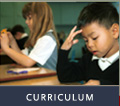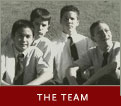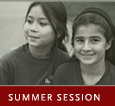











|

 
Stimulating and enjoyable, Dorris-Eaton's academically sound elementary
curriculum allows teachers to gently stretch students to meet their potential.
Children tackle all subjects with excitement and ease, because they know their
teachers are there to walk them, step-by-step, through the process of successful
learning. They also know that praise for a job well done awaits.
The multifaceted skill of reading is taught using a combination of phonics, sight
vocabulary, quality literature, poetry, spelling clues, and class discussions.
Guidance through the process of writing, along with a focused grammar program,
help develop strong, confident writers. From third grade biographers to fifth grade
essayists, students have ample opportunity to polish their style and skills. Their
grammar knowledge also provides a logical foundation for learning a foreign
language-in our case Spanish.
Public speaking, from early sharing to oral reports, fosters personal confidence and
leadership abilities. Inhibitions fall away as students prepare for musical
performances and speech and spelling competitions, or perform as part of the band.
In mathematics, the focus on computational and conceptual thinking skills builds with each grade.
Students are taught basic mathematical operations and to develop logical math strategies.
The emphasis on logical thinking facilitates the transition to the more advanced math
classes they will encounter in junior high.
Lively discussions and independent projects accompany history lessons on communities,
cultures, and countries. Students learn to discern trends, read maps, and understand
topography and its influence on history.
From moon phases to microscopes, metrics to microbes, the elementary science curriculum
is designed to unearth curiosity and organize the quest for answers by introducing the
scientific method and performing lab investigations.
In all that transpires throughout the elementary grades, thinking and questioning
are continually encouraged. After all, problem solving-from mathematical to
social-requires open-mindedness and initiative. At every level, encouragement
motivates students to do more, think more, and be more.
The difference is education.
|
 |







